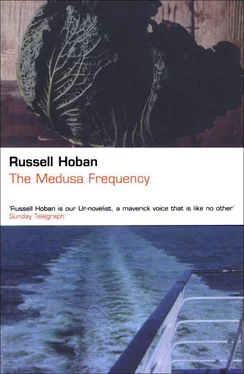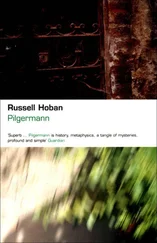‘Why do you have to ask so many questions? What good can it do either of us?’
‘What is fidelity to you?’
‘Fidelity is a matter of perception,’ I said. ‘Nobody is unfaithful to the sea or to mountains or to death: once recognized they fill the heart. In love or in terror or in loathing one responds to them with the true self; fidelity is not an act of the will: the soul is compelled by recognitions. Anyone who loves, anyone who perceives the other person fully can only be faithful, can never be unfaithful to the sea and the mountains and the death in that person, so pitiful and heroic is it to be a human being.’
‘I don’t think that’s true,’ said the head; ‘I don’t think it has anything to do with perception — I think some people are faithful by nature and others are not. Do you think Luise perceived you fully?’
‘No.’
‘And was she faithful?’
‘Yes, she was faithful to herself, faithful to anything she put her hand to, and faithful to me.’
‘As far as you know.’
‘I think it would have been beneath her dignity to deceive me; she was very dignified.’
‘Eurydice was a big perceiver,’ said the head, ‘she was constantly perceiving, her perceptions gave her no rest. My singing terrified her — I don’t mean little ordinary songs like the ones I did before I met her, I mean the kind of singing that I began to do on that golden afternoon. She heard in it the death of the tortoise, the death of the world-child, and the end of our love.’
‘How did you do that singing?’
‘Something would get me started, maybe a dragonfly or the light on the river or the look of a tree at night. I’d feel the ache in my throat just before the song came and my throat would open in a particular way as if I were an instrument shaped by the song that used me. When I heard the sound of the lyre I was again the tortoise and again there came the pains of death, the colours and the blackness. People said they heard more than one voice when I sang — they heard a strange human voice and they heard a second voice not human, voice of darkness, voice of
moment under moment, world under
world, dark under dark …’
The voice of the head of Orpheus changed, became estranged from itself, descanted above itself as it spoke more and more rapidly, the words blurring together as in an auctioneer’s chant or the muttered praying of a fanatic:
‘voice of the olive tree itself and notself, singing sunlight, singing shadow, singing greenlit shade and moon-wind …’
The two voices became more and more separate, the upper one seeming to speak faster than the lower; it sounded as if the voice of the mind was hurrying above the slow and ancient animal self:
‘singing dark, dark, darkness down, down, down …’
The words faded into silence, then the head said in its normal voice, ‘Of course when I sang there was the music of it.’
‘And that was the singing that moved stones and trees and charmed wild beasts?’
‘I don’t think it actually moved stones and trees; what it did was put them in a new place for those who heard the singing. Animals were entranced by it. Eurydice hated it, she said that music was never meant to do what my singing did.’
‘Did others like it? Did a lot of people come to hear you?’
‘Yes, a great many people came, some just because they liked to be in crowds, some for the singing and some for the freak show — many times after the singing I had convulsions and bled from the nose and mouth.’
‘Did you want to sing like that?’
‘Wanting doesn’t come into it, I am that which responds.’
‘I think of you and Eurydice,’ I said, ‘and I wonder what the idea of the two of you is.’
‘I think of that constantly,’ said the head. ‘Over and over again I live that golden afternoon by the river when my song brought the strange and many colours of death into her dream.’
‘And yet,’ I said, ‘it was as if she’d been waiting for that song, as if the death in it awakened the life in her — she too is that which responds.’
Just then I heard Melanie’s bare feet on the floor behind me and I closed the fridge as she came into the kitchen. She was wearing my anorak for a dressing-gown and she looked wonderfully naked in it.
‘Anything good in there?’ she said.
‘Three cans of beer, most of a salami, a mouldering of old cheeses, half a tub of margarine, half a jar of marmalade, half a pint of milk, and the head of Orpheus.’
‘Let’s have a look at the head of Orpheus.’
I opened the fridge.
‘Oh my God,’ she said.
‘What do you see?’
‘It’s all right, it’s only a rather filthy old cabbage but I must be very suggestible because just for a moment I could’ve sworn I saw this dreadful-looking head with no eyes and the flesh all eaten away.’
‘Yes,’ I said, ‘it’s a dreadful-looking thing.’ The head of Orpheus went on being itself but it kept its mouth shut as I carried it into the hall and put it in the larder under the stairs.
‘It was the head of Orpheus before it turned into a cabbage, wasn’t it?’ she said. ‘For you, I mean.’
‘Yes, it was, and please don’t tell me what Tycho Fremdorf did with his head of Orpheus in the film.’
‘He didn’t do anything with it; he simply watched it go by as it swam upriver. Then he said, “Behind the front of the day the head of Orpheus swims unseen.” The subtitle was “NARDIM DEMSTRA VAJ ONDRA TSINTA ORFNANDO ULZVANJO.’”
‘Then it never told its story?’
‘No, it never spoke, it only uttered a strange unearthly melancholy cry. Istvan did it on the Fairlight; he used the cry of the great northern diver and that sound the rails make in the underground when a train’s coming.’
‘Wheats-yew, wheats-yew?’
‘That’s it; and then the rumble and clacking of the train.’
‘But the head never actually spoke.’
‘Not a word.’
‘It spoke to me.’
‘Well, it isn’t a competition, is it.’
‘I don’t know what it is but I’m trying not to lose.’
‘What did it say to you?’
‘We talked about Orpheus and Eurydice and that sort of thing.’
‘You still want Luise back, don’t you?’
‘How’d we get from Orpheus and Eurydice to Luise and me?’
‘You’ve just answered my question.’
‘No, I haven’t. Luise’s part of the past — it’s just that I’ve been finding it difficult to work my way into the present.’
‘What about what happened earlier this evening? Was that what you call working your way into the present?’
‘That wasn’t work.’
‘I hope not. What are you going to do with that cabbage?’
‘I don’t know. Maybe I don’t have to think about it just now.’
‘Maybe after I leave it’ll be the head of Orpheus again.’
‘I can’t say what it’ll do, we haven’t known each other that long.’
‘You and the cabbage or you and I?’
‘The head of Orpheus and I.’
‘I shouldn’t like to come between you.’
‘I think we’re all in this together, you and I and the head of Orpheus.’
‘In what?’
I was about to say, ‘This story,’ then I decided not to. ‘I don’t know.’
‘For a moment I thought you were going to say, “This story.” I’m glad you didn’t.’
‘So am I.’
In the morning I came awake as I always do, like a man trapped in a car going over a cliff. Melanie stirred, clinging to the sleep that was casting her off. I looked at the long line of her back, the sweet Velasquez curve of her hip, then I got up and parted the curtains to see under a dark sky the distant red and green lights of the District Line and the long grey curve of iron sweeping towards Fulham Broadway. It was Saturday; an idle train stood empty while from behind it a Tower Hill train slid majestically round the long and shining curve.
Читать дальше












